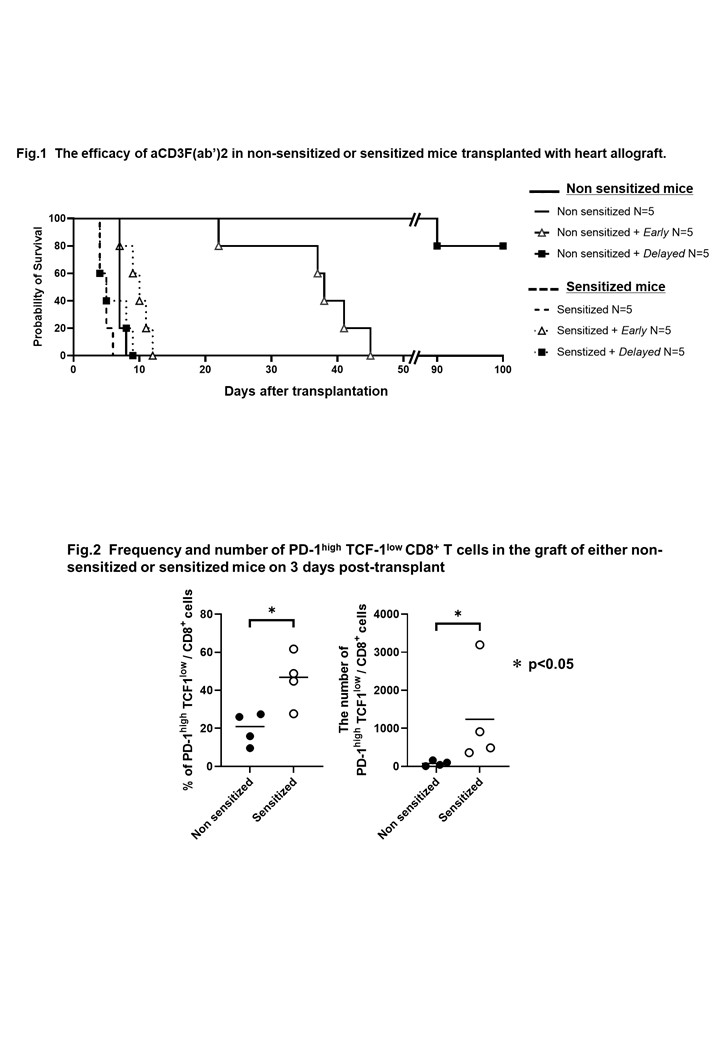The Impact of Early Graft Infiltrating TCF-1LowPD-1HighCD8+ T Cells in Delayed Fc Nonbinding Anti-CD3 Antibody Protocol in the Sensitized Mouse Model
1Dept. of Gastroenterological Surgery I, Hokkaido University, Sapporo, Japan, 2Dept. of Transplant Surgery, Hokkaido University, Sapporo, Japan, 3Division of Organ Transplantation, Hokkaido University Hospital, Sapporo, Japan
Meeting: 2022 American Transplant Congress
Abstract number: 635
Keywords: CD3, Sensitization, T cell graft infiltration, Tolerance
Topic: Basic Science » Basic Science » 02 - Acute Rejection
Session Information
Session Time: 5:30pm-7:00pm
 Presentation Time: 5:30pm-7:00pm
Presentation Time: 5:30pm-7:00pm
Location: Hynes Halls C & D
*Purpose: Fc nonbinding anti(a)-CD3 antibody has a unique effect that delayed treatment protocol induces a transplant tolerance. Delayed protocol allows early graft infiltrating cells which may preserve a favorable graft conditioning. However, early infiltration of allo-aggressive memory T cells may negatively affect in a clinical setting with memory population. We evaluated the effect of Fc-nonbinding aCD3 antibody in the sensitized situation in order to confirm evidence for future clinical application.
*Methods: C57BL/6 (B6, H2b) mice were transplanted with BALB/c (H2d) heart allografts. Skin grafting for 8-12 weeks was used for sensitization. Fifty mg of aCD3F (ab’)2 for 5 consecutive days on day -1 to 3 (Early protocol) or days 3 to 7 (Delayed protocol) were applied. FACS canto II was used for analyzing stained cells.
*Results: Early 5 days aCD3F(ab’)2 treatments (day -1 to 3) were significantly prolonged graft survival time in BALC/c-to-B6 heart transplant model (n=5, median survival time (MST) 38 days, Fig. 1). In contrast, Delayed aCD3F(ab’)2 treatments for 5 days (day 3 to 7) promoted an indefinite graft survival (MST >100 days, Fig. 1). Of interest, in sensitized mice, although Early protocol slightly prolonged graft survival (n=5, MST 10 days, p<0.01 vs. sensitized control, Fig. 1), Delayed protocol didn’t have any graft preserving effect (Fig. 1). When graft-infiltrating cells on 3 days post-transplantation were observed, a significant increase in percentages and numbers of CD8+ T cell was found in the sensitized group (p<0.05, vs. non-sensitized control). Furthermore, a significantly increased percentage of TCF-1low PD-1high CD8+ T cell subset was observed in day 3 graft-infiltrating cells of the sensitized group (n=4, p<0.05, vs. non-sensitized control, Fig. 2).
*Conclusions: Delayed aCD3 antibody protocol effectively promotes a transplant tolerance but not in the sensitized situation. Early graft infiltration of TCF-1low PD-1high CD8+ T cells may correlate with rapid graft rejection. The additional treatment strategy to inhibit this definite population would be crucial to achieve a favorable outcome by using Fc nonbinding aCD3 antibody in a clinical transplant setting.
To cite this abstract in AMA style:
Ota T, Goto R, Harada T, Ganchiku Y, Zaitsu M, Forgioni A, Kawamura N, Watanabe M, Fukai M, Shimamura T, Taketomi A. The Impact of Early Graft Infiltrating TCF-1LowPD-1HighCD8+ T Cells in Delayed Fc Nonbinding Anti-CD3 Antibody Protocol in the Sensitized Mouse Model [abstract]. Am J Transplant. 2022; 22 (suppl 3). https://atcmeetingabstracts.com/abstract/the-impact-of-early-graft-infiltrating-tcf-1lowpd-1highcd8-t-cells-in-delayed-fc-nonbinding-anti-cd3-antibody-protocol-in-the-sensitized-mouse-model/. Accessed March 5, 2026.« Back to 2022 American Transplant Congress

